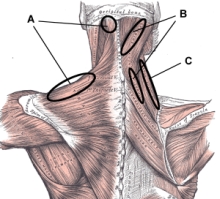| WHAT IS NECK PAIN? |
Injury and postural problems are the main cause of neck pain.  Physiotherapists can identify the reasons for your neck pain and provide proven effective treatment. Physiotherapists can identify the reasons for your neck pain and provide proven effective treatment.
What causes neck pain?Your head is heavy and balanced on a narrow support made up of seven bones called vertebrae. The vertebrae are separated from each other by discs, stabilised by joints and ligaments and moved by muscles. Because the neck is so mobile, it is easily damaged. Injury and postural problems are the most common causes of neck pain. Diseases such as arthritis or degeneration of the discs can also cause pain. Neck injuriesNeck injuries most often result from motor vehicle accidents, sports or occupational accidents. Damage may occur to vertebrae, joints, nerves, discs, ligaments and muscles. A common neck injury is the acceleration/deceleration injury or ‘whiplash’ where the head is thrown forward or backward. PostureBad posture can cause neck pain. Ligaments are over-stretched, muscles become tired and the neck joints and nerves are put under pressure. Slouching your shoulders with your head pushed forward, sleeping with your head in an awkward position, or working with your head down for long periods, will all tend to cause or worsen neck pain. . Preventing neck painSome useful advice to help you control and prevent neck pain: PostureThink tall: chest lifted, shoulders relaxed, chin tucked in and head level. Your neck should feel strong, straight and relaxed. SleepingA down pillow or a urethane pillow is best for most people. Avoid sleeping on your stomach. Your Physiotherapist will assess and advise you. RelaxationRecognise when you are tense. You may be hunching your shoulders or clenching your teeth without realizing it. WorkAvoid working with your head down or to one side for long periods. Frequently stretch and change position. Your Physiotherapist will show you how. ExerciseKeep your neck joints and muscles flexible and strong with the correct neck exercises. Your Physiotherapist will assess for tight or weak muscles and show you specific exercises to treat your situation. . How physiotherapy can helpPhysiotherapists will be able to determine the source of your neck pain and treat it. They may use: • Mobilisation • Manipulation • Functional and Rehabilitative exercises • Encouraging normal activity • Postural assessment, correction and advice • Relaxation therapy • Laser, ultrasound, electrotherapy and heat treatment • Massage Manipulation can be an effective treatment for neck problems, but it may not be the best option in every situation. After a full examination your physiotherapist will discuss treatment options with you. Your physiotherapist will carefully check your neck before manipulating it to see if other methods, such as mobilisation may be preferable. Your physiotherapist can also offer you self-help advice on ways to correct the cause of neck pain, such as practical ergonomic tips for work and in the home, adjusting furniture, relaxation and exercise. References: Australian Physiotherapy Association. www.physiotherapy.asn.au |

